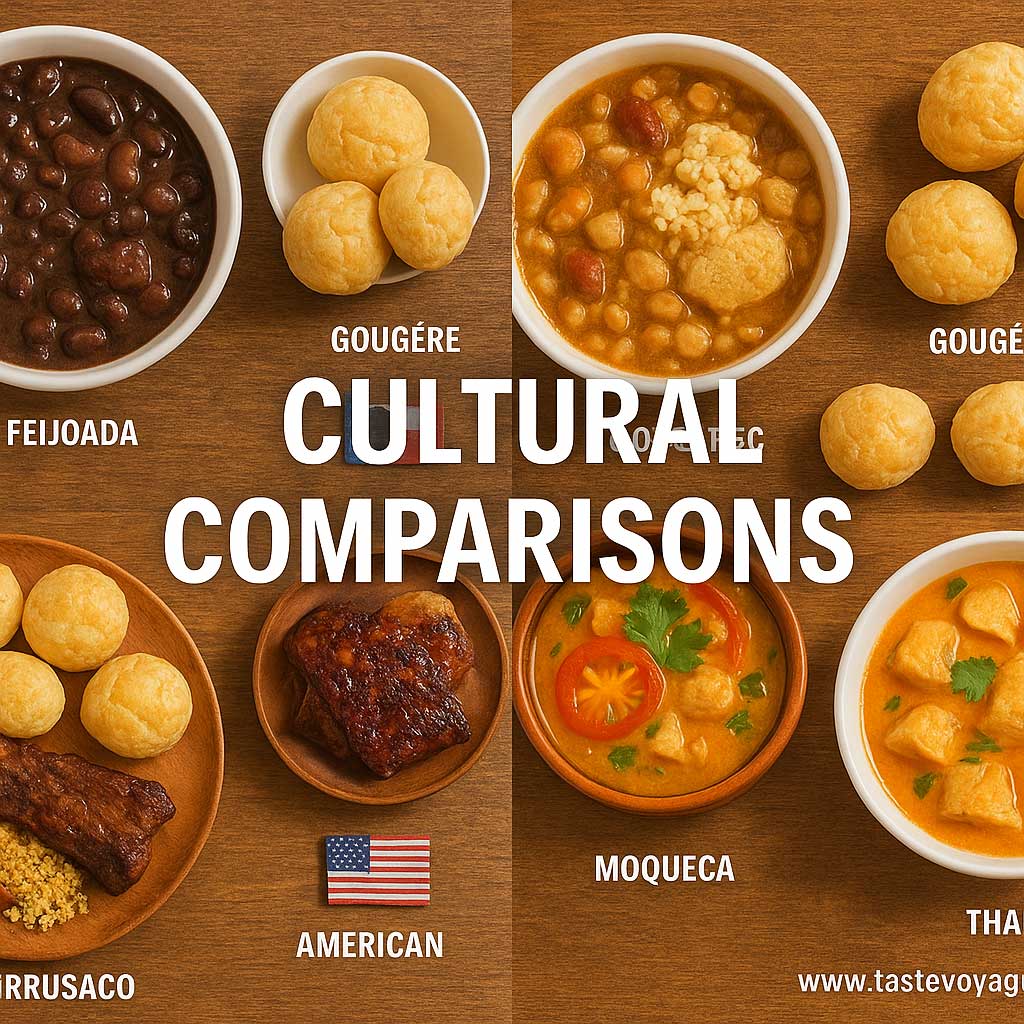Brazilian vs. Mediterranean Diet: Which Is Best for You?
Travel the World Through Food >> Brazilian Cuisine>>Cultural Comparisons>> Brazilian vs. Mediterranean Diet: Which Is Best for You?
Brazilian vs. Mediterranean Diet: Which Is Best for You?
Exploring the Culinary Richness of Brazilian and Mediterranean Diets
Food is a powerful reflection of culture, history, and tradition. Among the most captivating culinary styles are the Brazilian and Mediterranean diets. While each offers unique flavors and ingredients, both celebrate the art of nourishing the body with vibrant, wholesome foods. In this blog, we’ll explore the cultural and culinary significance of these two remarkable dietary traditions, highlighting their contributions to global cuisine.
The Heart of Brazilian Cuisine: A Tapestry of Flavors
Brazilian Cuisine is a vibrant mosaic that showcases the country’s diverse landscapes and cultural influences. From the lush Amazon rainforest to bustling city streets, food reflects a joyful and resourceful spirit. Staples like rice, beans, fresh fruits, and vegetables form the foundation of many dishes. Ingredients such as cassava, tropical fruits, and aromatic herbs are common, creating a colorful palette of flavors.
Culinary methods emphasize communal eating, with meals often enjoyed with family and friends. Dishes like feijoada—a hearty stew of black beans, pork, and spices—are more than just food; they are symbols of togetherness and celebration. Street foods such as acarajé and pão de queijo embody the creative use of local ingredients, showcasing the playful and inventive side of Brazilian cooking.
Brazilian cuisine also pays homage to its indigenous roots, blending native ingredients with African, Portuguese, and other influences. This fusion results in a diverse, dynamic food culture that values both tradition and innovation. The emphasis on fresh, natural ingredients aligns with a diet that promotes health and vitality, making it a beloved part of Brazil’s cultural identity.
The Mediterranean Diet: A Legacy of Balance and Simplicity
The Mediterranean diet is renowned worldwide for its emphasis on fresh, seasonal produce, healthy fats, and a balanced approach to eating. Rooted in the culinary traditions of countries bordering the Mediterranean Sea—such as Greece, Italy, and Spain—this diet celebrates simplicity and quality.
Culinary staples include olive oil, nuts, whole grains, legumes, fish, and an abundance of fruits and vegetables. Dishes like Greek salad, Italian pasta with fresh herbs, and Spanish tapas highlight the region’s love for sharing flavors and enjoying food in good company. This diet is deeply intertwined with the region’s social and cultural life, emphasizing moderation and the pleasure of eating.
Beyond its delicious flavors, the Mediterranean diet has cultural significance rooted in communal dining and a respect for nature’s seasonal bounty. It reflects a lifestyle centered on balance, mindfulness, and appreciation for quality ingredients. Over generations, this way of eating has promoted health and well-being, making it an integral part of the Mediterranean identity.
Cultural Significance and Culinary Heritage
Both the Brazilian and Mediterranean diets serve as more than mere nutritional guidelines—they are expressions of cultural heritage. They embody the history, environment, and social values of their regions. Brazilian cuisine’s lively, resourceful approach echoes a culture that thrives on sharing and celebration. Meanwhile, the Mediterranean diet’s emphasis on freshness and moderation speaks to a lifestyle that values harmony and community.
These diets have gained admiration globally because they highlight the importance of using natural, minimally processed ingredients. Their culinary significance extends beyond taste; they foster a sense of identity and connection to place.
Celebrating Diversity Through Food
In a world increasingly interested in healthy and sustainable eating, the Brazilian and Mediterranean diets offer inspiring models. They remind us that food is a celebration of life, variety, and tradition. Whether exploring the rich flavors of Brazilian dishes or savoring the simplicity of Mediterranean fare, we embrace a culinary journey that celebrates cultural diversity and the universal joy of good food.
By understanding and appreciating these diets, we gain insight into the vibrant cultures they represent. They teach us that food is not just nourishment but a powerful way to connect with community, history, and the environment. Embrace these culinary traditions and let them inspire your own journey into the world of flavorful, meaningful eating.
